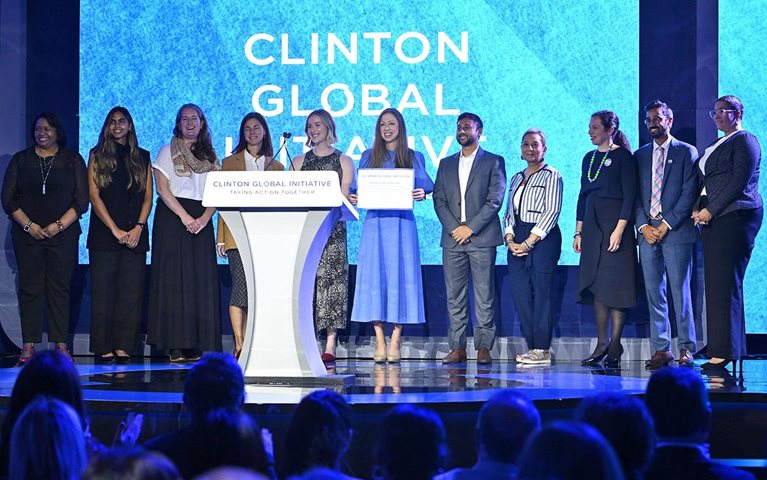“One of my students was disruptive and making inappropriate comments. I stayed calm and looked at the situation from his perspective: I had learned his mom didn’t want him back at home and he was living with his uncle. I was able to understand his behavior, and the principal and I worked to get him into the therapy program that he needed.”
This is just one example of the difference that Strong Resilient Youth, a free, online program is making. The training, developed by the Mayerson Center for Safe and Healthy Children at Cincinnati Children’s Hospital Medical Center (CCHMC) and the McKinsey Health Institute (MHI), helps educators and supportive adults develop the knowledge and skills for recognizing and responding to trauma in children.

Support children and youth experiencing trauma
This training equips parents, caregivers, educators, and other supportive adults with the knowledge and skills to support children and youth who have experienced trauma.
The program is grounded in the Substance Abuse and Mental Health Services Administration’s (SAMHSA) four Rs. Kana Enomoto, a partner and MHI’s director of brain health, explains the concept: “It doesn’t train people to treat trauma, but it trains them to realize that trauma is ubiquitous—and very common in how it affects people. Participants can recognize trauma when they see it, respond appropriately to a person exhibiting the signs of being traumatized, and then resist doing something that exacerbates the trauma.”

The Strong Resilient Youth program was born out of concern about the mental health of children during the COVID-19 pandemic. When the world was going into lockdown and schools moved online, teachers had a view into the home lives of children they had previously only seen in the classroom.
“We talked to a lot of experts who were concerned about the stress on families and how that may play out for kids with potential increases in domestic violence or incidents of child abuse,” explained Kana. “In one school district survey, parents reported being more concerned about mental health than loss of learning. And there was a strong desire at the McKinsey Health Institute to do something that was accessible for teachers who were now seeing a different side of their students’ lives.”

McKinsey Health Institute
Adding years to life and life to years
It was designed to help educators recognize the signs of trauma and de-escalate situations to move forward in a more productive and healing fashion. “We have worked together with school systems, after-school programs, and others to create a training that is responsive to the needs of kids and staff,” says Dr. Bob Shapiro, Director of the Mayerson Center.
A typical scenario that plays out in classrooms is when a child is acting out, the teacher tells them to be calm or sit down. The child responds negatively because they are distressed, and the situation escalates. Participants learn to give the child some space, realize what’s going on, and ask questions like: ‘Would it help you to sit outside for ten minutes? Can I have someone come talk to you?’
“This gives the child agency in the situation and helps him or her self-regulate. And then life goes on,” explains Kana. “We don’t have to go to the principal’s office; we don’t create a disciplinary problem.”
Over the next year, the MHI and CCHMC teams worked with mental health and children’s organizations to develop the training, which featured experts from around the world. Learning practitioners from McKinsey Academy helped develop the curriculum while McKinsey Digital colleagues managed the tech aspects of the project. Within a year, the training was rolled out to schools in the US Midwest.
It’s the pebble that creates a lot of ripples. If in that first interaction we can handle the trauma appropriately, we prevent so many downstream consequences.
Then the invasion of Ukraine happened, and the Czech Republic was receiving a significant influx of Ukrainian children who were being placed in local schools. Given the volume of need, the training was rolled out to educators and caring adults, such as coaches, bus drivers, and aid workers.
Dr. Tamara Baer, a McKinsey associate partner and a practicing pediatrician who focuses on healthcare for vulnerable populations, recalled hearing from a Czech social worker that the training “helped me get a better understanding of people’s behavior, and it became obvious that most of [my adult clients] experienced trauma in their childhood. Now, I can see them in a different light, and I understand them better.”
The program was translated into Czech, Ukrainian, and Spanish; and in the US it has been made available through the National Council for Mental Wellbeing to certified teen and Youth Mental Health First Aid Instructors. “Certification in the free Strong Resilient Youth training equips MHFA Instructors and other caring adults with additional tools to help children and youth build resiliency and positive coping strategies, as they gain a deeper understanding of how trauma manifests itself in communities,” says Tramaine EL-Amin, vice president, Mental Health First Aid.
Erica Coe, global co-leader of MHI who helped establish the program, is most proud of the fact that people are experiencing the training as life-changing. “It’s the pebble that creates a lot of ripples,” she says. “If in that first interaction we can handle the trauma appropriately, we prevent so many downstream consequences.”

